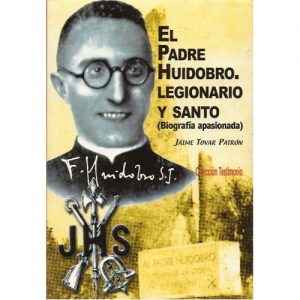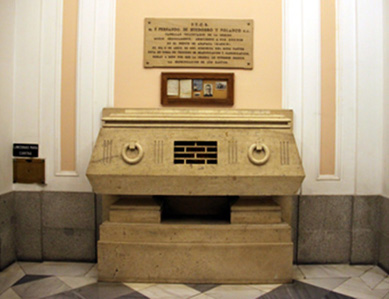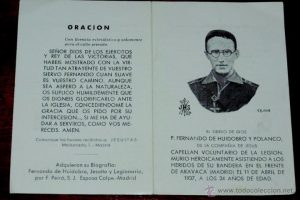April 11th - Servant of God Ferdinand de Huidobro, SJ
Born: March 10, 1903
Died: April 11, 1937
Cause Initiated: November 19, 1947
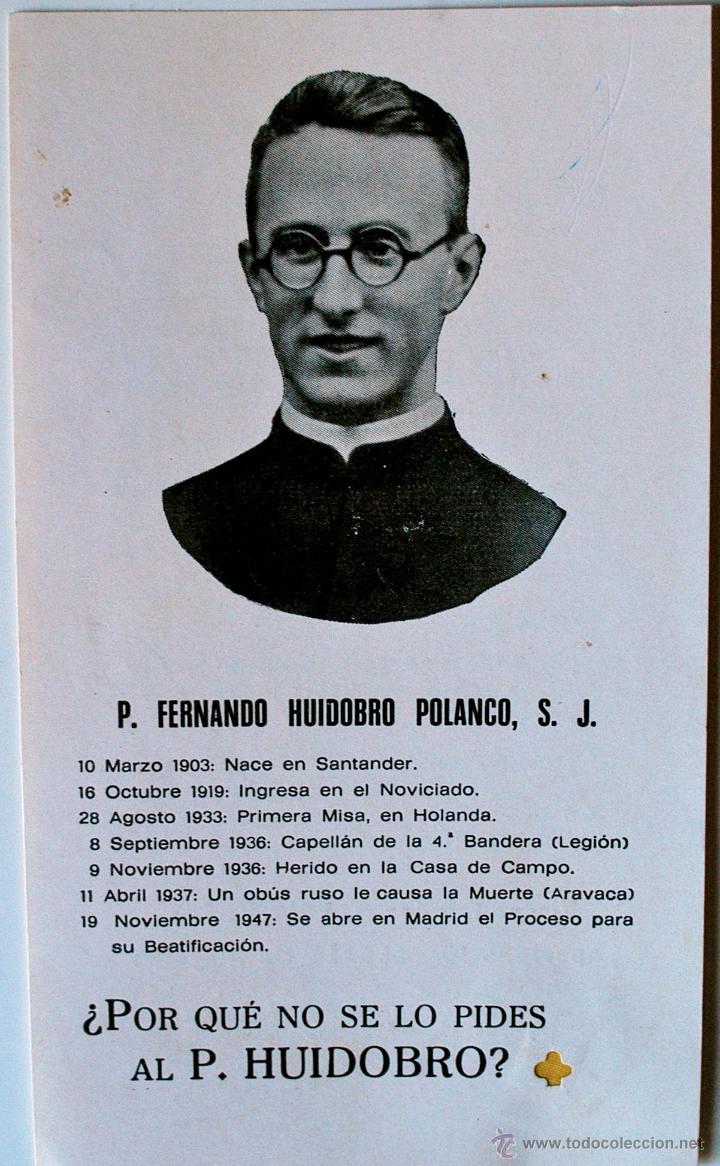 Ferdinand de Huidobro Polanco was born at Santander, Spain. His father was a mining engineer and he was the sixth of nine children. When Ferdinand was five, his family moved to Melilla, North Africa when his father worked as the city’s new harbor. They moved back to Madrid after three years because of political problems where young Ferdinand attended Holy Angel College for the next six years and though he was not a member of the college’s St Stanislaus Kostka sodality, he joined its members during Lent 1918 in making a retreat as he wanted to know what God wanted him to do after college and the outcome was his decision to join the Society of Jesus. As he was only fifteen, he obeyed his mother’s advice to consider religious life until he was older and went on to study law at “Areneros” in Madrid but after one year when he was more convinced than ever that he wanted to join the Jesuits, and with his mother’s blessing he entered the novitiate at Granada and arrived there on October 16, 1919.
Ferdinand de Huidobro Polanco was born at Santander, Spain. His father was a mining engineer and he was the sixth of nine children. When Ferdinand was five, his family moved to Melilla, North Africa when his father worked as the city’s new harbor. They moved back to Madrid after three years because of political problems where young Ferdinand attended Holy Angel College for the next six years and though he was not a member of the college’s St Stanislaus Kostka sodality, he joined its members during Lent 1918 in making a retreat as he wanted to know what God wanted him to do after college and the outcome was his decision to join the Society of Jesus. As he was only fifteen, he obeyed his mother’s advice to consider religious life until he was older and went on to study law at “Areneros” in Madrid but after one year when he was more convinced than ever that he wanted to join the Jesuits, and with his mother’s blessing he entered the novitiate at Granada and arrived there on October 16, 1919.
Ferdinand took his simple vows after two years and continued his humanities and philosophy studies for the next six years during which this he also taught catechism to gypsies in a nearby village and organized the impoverished young olive pickers to talk to them about God. Then he went on to teach young Spanish lads in grammar and literature before embarking on his theology at Ona in 1930. The political scene in Spain was changing and with the king’s exile, the dictatorship was replaced by a republic which eventually ended in Spain’s terrible civil war. When the republican government dissolved the Society on October 13, 1931 after burning its residence in Madrid and Ferdinand and the other Jesuits were exiled to Marneffe, Belgium with the closing of the Ona theologate. Later he went to Valkenburg, Netherlands to continue his theological studies and was ordained there on August 27, 1933. Fr Huidobro stayed on to complete his tertianship in Braga, Portugal in 1934. He had planned to get a double doctorate in philosophy, one in Spain and another in Germany. However when he was pursuing his graduate studies under the renowned German philosopher, Martin Heidegger in October in July 1936 civil war broke out in Spain and being concerned about the spiritual welfare of others and now that his country was sorely divided, he wrote to Fr General in Rome for permission to serve as a chaplain in Spain’s nationalist army against the reds with their communist leanings. With readily granted permission, Fr Huidobro soon arrived in Spain and was made chaplain to the legion’s Fourth Regiment.
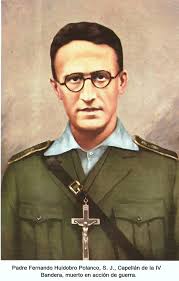 Although Fr Huidobro’s career as army chaplain lasted a short six mo9nths he performed acts of genuine heroism during that brief period. He was as much a legionnaire as any of his soldiers; he marched when they marched and shared all their hardships. He selflessly cared for the wounded and would throw himself over their bodies to prevent them from receiving more injury. When he himself was wounded and was taken to a hospital at Talavera, a civilian hospital, he petitioned the physicians at Talavera to transfer him to an army hospital as he preferred to be with his legionnaires. When he was back at his regiment’s hospital, he was dragging himself with the aid of a cane, visiting his men and embracing each as a brother. Two months later, in January 1937, his army was ordered to Toledo to prepare for a major offensive with 2,000 men against 20,000 hostile forces. During that bloody war, Fr Huidobro worked so heroically among the wounded caring for them and evacuating them that his regiment recommended him for the Military Medal. They attributed the regiment’s ability to withstand the reds from God’s protection and Fr Huidobro’s prayers.
Although Fr Huidobro’s career as army chaplain lasted a short six mo9nths he performed acts of genuine heroism during that brief period. He was as much a legionnaire as any of his soldiers; he marched when they marched and shared all their hardships. He selflessly cared for the wounded and would throw himself over their bodies to prevent them from receiving more injury. When he himself was wounded and was taken to a hospital at Talavera, a civilian hospital, he petitioned the physicians at Talavera to transfer him to an army hospital as he preferred to be with his legionnaires. When he was back at his regiment’s hospital, he was dragging himself with the aid of a cane, visiting his men and embracing each as a brother. Two months later, in January 1937, his army was ordered to Toledo to prepare for a major offensive with 2,000 men against 20,000 hostile forces. During that bloody war, Fr Huidobro worked so heroically among the wounded caring for them and evacuating them that his regiment recommended him for the Military Medal. They attributed the regiment’s ability to withstand the reds from God’s protection and Fr Huidobro’s prayers.
During a short respite from army life, Fr Huidobro went to Villafranca to pronounce his final vows on April 5, 1937. He returned the next day to rejoin his regiment at Aravaca which was preparing to leave to participate in the siege of Madrid. The fighting was fierce and uninterrupted from April 8 until 13 and during this time Fr Huidobro was in the front lines selflessly tending to the dying and the wounded in the trenches. He only moved behind the lines and care for the wounded there when the commander ordered him to do so. While working there he and several legionnaires were hit by an enemy shell and were killed by the blast. Fr Huidobro was only thirty-four years old when he died on April 11, 1937.
Fr Huidobro’s sacrificed his life for the wounded of his regiment because of his deep love for God and his love of neighbor. His body was first buried in Toledo but his remains were later moved to the Jesuit novitiate in Aranjuez and later transferred in November 1958 to the church of the Sacred Heart of Jesus and St Francis Borgia in Madrid. His cause was initiated on November 19, 1947.
